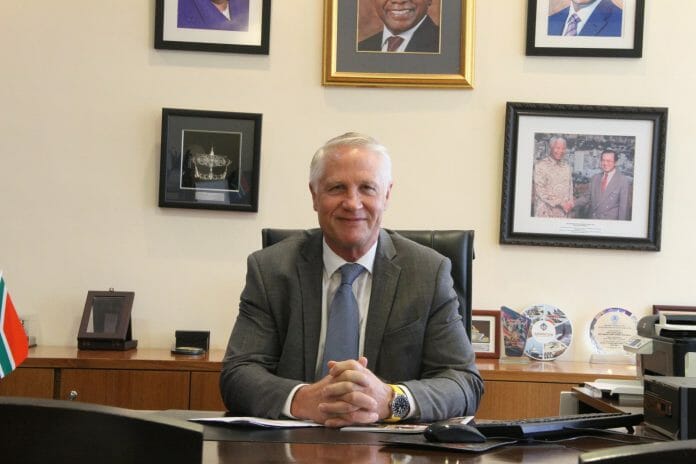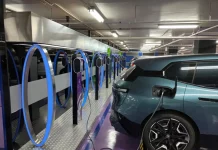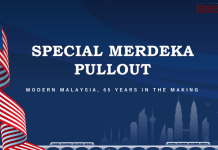By Sharon Chang
South Africa, the largest economy in Africa, has traditionally been focused in the primary sectors due to a wealth of mineral resources and favourable agricultural conditions, but now, the country is moving towards becoming a knowledge-based economy, with a greater focus on technology, ecommerce and financial and other services. Among the key sectors that contribute to the gross domestic product (GDP) and keep the economic engine running are manufacturing, retail, financial services, communications, mining, agriculture, and tourism.
Since the early 90s, Malaysia and South Africa have deep rooted relations and regard each other as close partners in the developing world.
Recently, during an interview with Business Today, Schoeman du Plessis, Acting High Commissioner of South Africa to Malaysia, speaks on strengthening and reviving the ties between both countries.
“There are opportunities for us to connect as we have many similarities between both our countries. South Africa looks forward to a much-improved relationship with Malaysia.”
South Africa is an emerging market with ample natural resources, but its economic growth has slowed, what are the reasons and how can South Africa strengthen its economic standing?
We have a very diversified economy with no single economic sector that dominates. For example, manufacture and mining contribute around 13 percent and 20 percent respectively to our GDP, whereas finance and services is the biggest sector which is around 25 percent.
For the past 26 years since democracy, South Africa remains a very unequal economy where we have a high primary performing economy and a very poor informal economy. While democracy has delivered freedom for all our people, but not enough has changed for those living in the country’s vast township. And this is the challenge we face – to uplift the biggest part of the population into a formal economy. Now, with the coronavirus pandemic, it can be an opportunity for South Africa to completely change the way we have been doing business, we need more investment into the poorer townships like better housing, improve basic utilities like water and especially healthcare. We need to increase social spending which was not enough in the past.
What role can South Africa play given the rise of dynamic economies like Rwanda?
In the past, the challenge of colonialism was that the countries are not connected with each other in Africa, it is almost impossible to transport your goods and services from one country to another because of bad transportation infrastructure.
Now, South Africa being the most diversified and largest economy in the continent and also the chair of the African Union (AU) this year, what we and other African nations’ leaders are trying to do is promote and support economic integration across the continent.
Firstly, under the African Continental Free Trade Agreement, there is a new dynamism and optimism about the future of Africa, it will be easier for goods and services to move across the continent and secondly, more infrastructure projects to connect countries with each other which is really important.
And then thirdly, to prevent and resolve long-running conflicts in Africa which is detrimental because there are so many African states which are still underdeveloped. There are many mechanisms in the AU which we hope will unlock the continent’s economic potential. It is a slow process because many countries are still sovereign, and the AU is not a body which can enforce decisions on African nations.
But, most importantly, with the ACFTA, it will free the movement of trade and better reallocation of resources between African nations and make it easier for countries around the world to invest in Africa.
What is the current state of the diplomatic relations between Malaysian and South Africa?
In the early 90’s during the Mahathir’s administration, and that was also the time when South Africa became a democratic country, we had very warm relations. South Africa and Malaysia were the two countries pushing for the South-South cooperation so that developing countries could come together to build stronger ties.
But unfortunately, both countries lost some of the interest and ties which brought us together in the first place because of diversification. South Africa became more invested in Africa and the BRICs states, whereas Malaysia also moved its focus towards pro-China policy.
In the past, Malaysia has invested quite heavily in South Africa. Now, where do you see the opportunities?
Yes, Malaysian investors have been particularly active in South Africa during the 1990s and one of the biggest investments was the Petronas stake in Engen. Petronas has done very well, they had more filling stations in South Africa compared to Malaysia. Some of the other investments were in the property and related tourism markets. But, due to the Asian Financial Crisis, most investments were taken back to Malaysia.
One of the last real estate involvements was the development of the Durban Point Waterfront by Sunrise UEM. Today, we have less than two percent of Malaysian investments in South Africa.
There is so many opportunities in Africa especially in the agriculture and halal sectors. Sixty percent of all the available agricultural land in the world is there and now with the problem of food security, it is a good opportunity for Malaysia to consider investing in agriculture in Africa.
There is a population of 800 million Muslims in Africa and hence, it is an area whereby Malaysia can invest. I have been championing the halal food production sector which I see a huge potential for Malaysia to have a presence.
I have been telling Malaysia to cooperate with South African companies to tap into manufacturing whether its food or products because we have strong manufacturing sectors, good infrastructures, and solid financial system. So, if Malaysian investors partner with them they would have a readymade distribution network for halal products.
Moreover, Malaysia should also look into exporting their palm oil to Africa.
Why are there not many investments coming into Malaysia?
In my opinion, everything starts from the top. There must be more government interactions to begin with for businesses to feel comfortable to invest in a country. So, one of the goals is to conduct more high-level interactions with Malaysia and South Africa but it has been rather difficult because of the change in administrations these past two years. Most importantly, the goodwill of both the nations have been strong.
Currently, we have Nandos which operates here and Sanlam, one of the largest financial services groups in South Africa which bought a majority stake in Malaysia’s MCIS.
There will be more opportunities post-Covid as we are looking into ASEAN for more market access.
How does South Africa see Malaysia as a tourist destination?
South Africans are very much into eco-tourism, but they are also looking for value. For many, Malaysia is more of a transit point to stay a couple of days before heading to Thailand or Indonesia.
There are magnificent island resorts here in Malaysia, but there is not enough promotion done on them. People in South Africa need to learn more on what Malaysia has to offer as a tourist destination. Everyone is always looking for an island getaway.
Education is one of the most important fields where relations and cooperation could be strengthened between countries. How competitive is Malaysia in the education sector?
There are not many South African students in Malaysia because we have good universities but for the rest of Africa there is a big business opportunity.
In Africa, education is your ticket out of poverty. People in Africa invest a lot of money in education, so they are always looking for opportunities to educate their children. Before Covid-19, there are 80,000 African students in Malaysia. But like I always say Malaysia is not exploiting this opportunity enough as there is a huge population in Africa who are willing to pay for an education.
Malaysia should open satellite campuses to provide higher educational opportunities for students who would otherwise not have access. Lecturers could utilise virtual networks that allow access to classroom instruction and services. This pandemic has proven distance learning is the way to go.
How do you see Malaysia as a gateway for South Africa’s market expansion into ASEAN?
We do see Malaysia as a springboard for market access into ASEAN. For the past few years, our state-owned freight transport and handling enterprise, Transnet Freight Rail, which manages all the ports and railway lines for freight in Africa, has been in talks with a Malaysian company to build a port in Perlis. It is going to be a seaport and an inland port on the Thai border and when completed it will be the first and closest port of call linking Africa to Asia. This project investment will be very lucrative to both South Africa and Malaysia in the future.
” Malaysia will always be a very important friend to South Africa in Asean”
What are the concerns which can be addressed between both our countries to improve the relations better?
The goodwill, solidarity and memories remain, the historical assistance which Malaysia gave to South Africa for its anti-apartheid stand will not be forgotten. But at the government level, more needs to be done. The government must show more interest for businesses to invest. I hope for more interactions with Malaysia moving forward.
South Africa still has a very favourable view of Malaysia. It is important we build on that as both our countries need each other.










